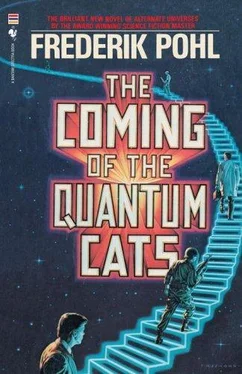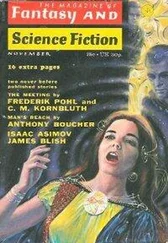Frederik Pohl - The Coming of the Quantum Cats
Здесь есть возможность читать онлайн «Frederik Pohl - The Coming of the Quantum Cats» весь текст электронной книги совершенно бесплатно (целиком полную версию без сокращений). В некоторых случаях можно слушать аудио, скачать через торрент в формате fb2 и присутствует краткое содержание. Год выпуска: 1986, ISBN: 1986, Издательство: Bantam Books, Жанр: Фантастика и фэнтези, на английском языке. Описание произведения, (предисловие) а так же отзывы посетителей доступны на портале библиотеки ЛибКат.
- Название:The Coming of the Quantum Cats
- Автор:
- Издательство:Bantam Books
- Жанр:
- Год:1986
- ISBN:9780553763393
- Рейтинг книги:5 / 5. Голосов: 1
-
Избранное:Добавить в избранное
- Отзывы:
-
Ваша оценка:
- 100
- 1
- 2
- 3
- 4
- 5
The Coming of the Quantum Cats: краткое содержание, описание и аннотация
Предлагаем к чтению аннотацию, описание, краткое содержание или предисловие (зависит от того, что написал сам автор книги «The Coming of the Quantum Cats»). Если вы не нашли необходимую информацию о книге — напишите в комментариях, мы постараемся отыскать её.
The Coming of the Quantum Cats — читать онлайн бесплатно полную книгу (весь текст) целиком
Ниже представлен текст книги, разбитый по страницам. Система сохранения места последней прочитанной страницы, позволяет с удобством читать онлайн бесплатно книгу «The Coming of the Quantum Cats», без необходимости каждый раз заново искать на чём Вы остановились. Поставьте закладку, и сможете в любой момент перейти на страницу, на которой закончили чтение.
Интервал:
Закладка:
"Labor Day?" I gaped at him, but he'd unfastened his seat belt to come next to me, leaning to the window.
"Could you see my battalion on the White House grounds?" he asked, disappointed because we were looking the wrong way. I shook my head. "That's crowd control for the parade," he announced, winking.
"Jesus! Labor Day's not for ten days yet. Do you think the Russians are dumb enough to buy that?"
He shrugged. "If they weren't dumb, they wouldn't be Russians," he offered, and buckled in because the steward sergeant was coming down the aisle to frown at him.
But apart from that one little patch, there was the same old District, all peaceful and busy and happy. All the other roads were the way they ought to be. Even from the air you could see dearly that these people were not worried about any invasions. .
And on the other side of the barrier, I knew, there was another Washington, where our first assault wave had gone through and taken all the Potomac bridges.
And what the people in that Washington were doing that Friday night I could not imagine.
When we got out at Boiling and showed our orders the transportation clerk offered to get the colonel a staff car, provided he'd drop me off on his way to the White House. It was a good deal for both of us. On the drive in the colonel did everything but bounce around in his seat with anticipation and joy. He had already let me know he was a West Pointer, and I'd seen the Chile and Thailand ribbons on his chest. "This will be the biggest yet," he promised. "You'll get your silver leaf out of it, Major, so cheer up! You don't get promotions for being in a secure zone when an invasion's going on!',
"Yeah," I said, gazing out at the Virginia countryside. What he said was true enough. What he didn't know was that General Ratface was not going to forget me. He couldn't court-martial me after giving me a medal two hours earlier. But he would remember. Some day, sooner or later, I would be caught hoisting a beer in the Officers' Club or spitting on some GI sidewalk, and then the general would sink his teeth into my throat for the kill.
Unless, of course, I picked up a few more medals in this operation. I'm a prudent man. But it looked to me as though the most prudent thing I could do now was to be a hero, first chance I got . . .
We crossed the bridge right under Arlington Cemetery, with the eternal light flickering on the hillside behind us. Traffic was heavy and civilian, though I knew that right here, on this very structure, our troops were holding the enemy off, just a wrinkle in time away. And ahead of us— "What the hell is that?" I asked, pointing to what looked like million-candlepower searchlights blinking into the sky.
"Must be time for the Russian satellites to come over," said the colonel. "Those strobes are on top of the White House and the Sheraton Command Center, and if the Russians can make out any details with their optics fried, they're welcome to them. Anyway," he added, grinning again, "they're just more practice for the Labor Day fireworks celebration."
He dropped me at the driveway to the Sheraton Hotel, commandeered for an operations headquarters. When I showed my orders I found out the front door was for full colonels and up only; people like me had to go around to the ballroom entrance, through the parking lots. And the lots were full. Not with the usual tourists' cars and VIP's limousines; there was at least a division's worth of tanks and personnel carriers parked in orderly ranks—and with a few not-very-orderly-at-all vehicles that had been pulled back from the first assault. Some of them had taken heavy fire. One or two were a real surprise, because I couldn't see how they'd got back at all—a turret blown off one medium-heavy, a weapons carrier that seemed to have burned, four or five other vehicles with holes in them that hadn't come from moths. They were all under tarpaulins to keep the orbiting Russian eyes away, and armed guards patrolled that part of the area.
And just beyond the fringe of boxwood hedge were the busy streets of the District, where a million people were buzzing along without a care in the world.
Whatever was happening in the lobbies and bars and restaurants of the hotel, people like me were not likely to find out. Our part of the hotel was the meeting rooms, and they were as close to GI as they could be made. I got a badge to hang on my blouse in exchange for a copy of my orders, and was sent to the William McKinley room for disposal. On the way I passed a ballroom that was full. It was neither a wedding nor a bar mitzvah; what it was full of was troops, mostly in their underwear, changing from the uniforms of their side in which they had been captured to the uniforms of ours in which they would be discreetly transported to the stockades in the Maryland hills.
Prisoners.
I paused, rubbernecking. These weren't the Air Force guards we'd captured at Sandia. These were combat soldiers, and the wounded among them proved it with their dressings. The differences between their uniforms and ours were multiple, but not all that conspicuous at first glance. The basic color of the uniform was the same olive-drab for both. Their chevrons were smaller than ours, and silver-edged where ours were all black. Ribbons were something else—I couldn't see them clearly enough to tell much, and the MP captain in charge of their guards was beginning to give me hostile looks. Besides, my orders had been to report to the William McKinley room at once, and who knew if the door guards had phoned ahead?
If they had, it made no difference. The tech sergeant at the table by the door had never heard of me. She pawed through papers, muttered into a phone, turned the papers upside down and pored over the back of them and finally said, "Take a seat, Major. We'll get to you as soon as possible."
I didn't have any trouble translating that. "As soon as possible" meant "when we find out who you are and what you're supposed to be doing here." I resigned myself to spending the next considerable fraction of my life on one of the gilt-backed banquet chairs lined along the wall.
It wasn't quite that bad. There were anywhere from fifty to a hundred people going in and out of that room. Hardly any of them paid any attention to me. But it was no more than twenty minutes, and I'd only had my feet stepped on twice as people in a hurry crowded past, when the sergeant came back. "This way, Major," she said. "Lieutenant Kauffmann is ready for you now."
Lieutenant Kauffmann was not only ready for me, he said, first thing out of his mouth, "Where the hell have you been, Major? You're supposed to be over at the White House right now."
"The White—" I began, but he cut me off.
"Right, and you're supposed to be in civilian clothes too. It says here"—he speared a folder out of the stack on his desk—"that you closely resemble a U.S. senator on the other side-"
"Resemble him, hell. I am him."
He shrugged. "Anyway, you're going to assume his identity. After the first wave has secured the White House-"
It was my turn to cut him off. "We're invading the White House?"
"Where've you been?" He groaned again, this time with a different intonation. "They haven't responded to our messages; now we try force. You'll go in civilian clothes, as I said, and take two guards in their uniforms with you. You'll get orders from the portal master, but it looks like they want you to find the President, take her prisoner, and bring her back here."
"Holy shit," I said, and then, "Wait a minute. What if the real Senator DeSota is there?"
"He's not," he said positively. "Didn't you capture him yourself?"
"But he got—I mean, I thought he'd returned to his own time."
Shrug. Translation: Not my department. "So," he went on, "get your B-four bag and change into civvies, and we'll get you transportation to—"
Читать дальшеИнтервал:
Закладка:
Похожие книги на «The Coming of the Quantum Cats»
Представляем Вашему вниманию похожие книги на «The Coming of the Quantum Cats» списком для выбора. Мы отобрали схожую по названию и смыслу литературу в надежде предоставить читателям больше вариантов отыскать новые, интересные, ещё непрочитанные произведения.
Обсуждение, отзывы о книге «The Coming of the Quantum Cats» и просто собственные мнения читателей. Оставьте ваши комментарии, напишите, что Вы думаете о произведении, его смысле или главных героях. Укажите что конкретно понравилось, а что нет, и почему Вы так считаете.












